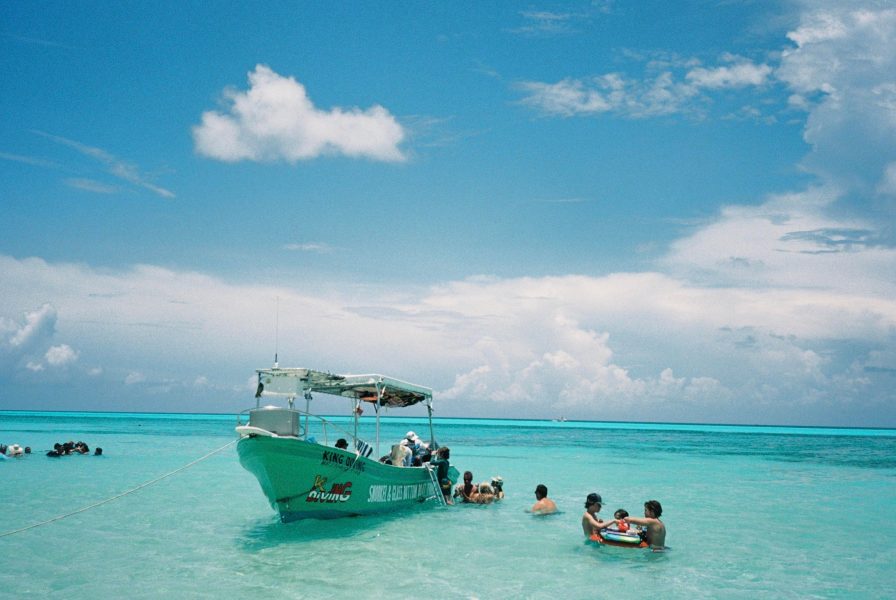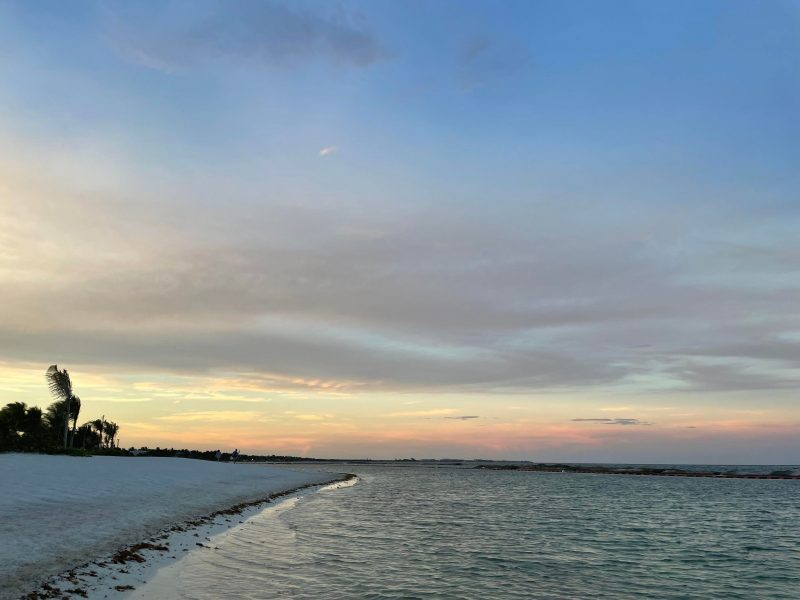A picture of Cancun

Aran Grover recounts his experience and exploration of Cancun, Mexico.
I should preface this to say that this piece was inspired by the far superior, A Small Place by Jamaica Kincaid. While I am not taking this as seriously as Kincaid, I do not want this to diminish her important and informative work, please read it if you have a chance.
When you land in Cancun International you see swathes of European and North American people lining up before passport control. The cacophony of languages and accents is mostly dominated by what I understand as ‘regular American’. This demographic seems to be mostly made up of ‘Spring Breakers’ looking to swerve around the American drinking age, families looking for sun and sea in a resort they never have to leave for the duration of their stay, and business people who will be incredibly productive for the next few days. On your way out of the airport, there are shops and restaurants which say things like “paradise” and “exotic”. You get into a taxi that has beer and coke in an ice box waiting for you; a preview of how everything will taste for the next week. When you start driving to your hotel, you see that everything is built around highways. There are minimal pavements and almost no pedestrian crossings, familiar to any California or Florida native. The city is designed around cars, just like America. Either side of these god-roads are hotel resorts and designer clothing shops, golf courses and nightclubs, dotted with white and red faces shrouded by sports sunglasses and baseball caps. It is the image of Ibiza, Aia Napa, and Magaluf, but crudely injected with a hefty dose of American excess.
It is the image of Ibiza, Aia Napa, and Magaluf, but crudely injected with a hefty dose of American excess
While Cancun’s flashy and garish exterior entices you into parting with your hard-earned cash, behind it, there isn’t much culture or history. In the 1970s, Cancun experienced a significant transformation in its landscape. Before this, the area was covered in dense mangrove jungle and had a settlement inhabited by a mere 200 fishing people. The forest was mown down and left behind was a brilliantly white beach; it was a fresh canvas to project the aspirations of a thriving tourism industry. As Naomi Klein would say, it was ‘blanked’. The fishing people were taught English, and other nearby indigenous Maya people were enlisted to build 5-star monuments to the practices of Milton Friedman, Adam Smith, and the Trump family, and some fifty years on, we have a monolithic city of “paradise”, spliced in two by a giant highway.
But regardless of this, you feel elated when you reach the hotel resort, you passed by some others on the way and were impressed, but you reach your own and gawp at its swanky glory. A modern development, with the entrance on the side of one of the aforementioned god-roads. As the cab drives up to the booth to open the gate, there is suddenly a litany of questions that you can’t quite comprehend as you learnt close to zero Spanish before the trip. The driver is being interrogated, he has to sign forms, he has to show his license, you think, ‘Wow, the security here is fantastic!’ But naively, it doesn’t cross your mind as to why. You think it might be because of high-profile guests, but then are the world’s richest really staying in the same hotel as you? OR in a hotel at all? So, you wonder, and eventually, the thought leaves you, because you’re suddenly distracted by the prices. Nothing on the lunch menu falls below the equivalent of £20, the minibar in your room charges £50 for a bottle of Jack Daniels but thank god the water is free.

Soon though, you realise that the long-awaited beaches are not like those you’d find in Europe. Once you wander through the air-conditioned, white-walled hotel lobbies, past the child-infested pool and the rows of bleach-white apartments, there is the perfect image of a Caribbean beach, complete with locals carrying weighty loads of hats and bags and the like to pawn off to people like you. Like the hotel before it, the sand is flawlessly white. So white that even the pasty gringos who plonk themselves upon it strike a glaring contrast. The water is a crystal-clear, cerulean blue, the perfectly formed palm trees sway in the wind as stray pina coladas litter the pearly sand, the heat is sweltering and impossibly humid, but you don’t care, because all of this is a constant reminder that you’re not in Exmouth anymore.
And it is hard to avoid the feelings of elation that come with this reminder. You feel proud to have escaped the banality of life in your home country, proud to have achieved “paradise” as they tell you. This pride is especially hard to shake when there is nothing in Cancun to say you aren’t welcome or to dispel your entitlement to said welcome. Everyone speaks English, you can pay for most things in dollars, you can play golf, most people you will meet look just like you (if you’re white) and if you’re American, you might even meet someone you already know.
The water is a crystal-clear, cerulean blue, the perfectly formed palm trees sway in the wind as stray pina coladas litter the pearly sand, the heat is sweltering and impossibly humid, but you don’t care, because all of this is a constant reminder that you’re not in Exmouth anymore
However, this feeling of belonging, elation, and peace is disrupted by the whirring of a military fighter jet, slicing through the pale blue sky. An odd sight but you think nothing of it, until suddenly the obnoxious trundle of a military truck bounds down the beach, just five metres from your sun lounger. It is clad with men in military costumes, surveying the scene with a close eye, and armed with rifles. As they pass you ponder the reason for their presence, but quickly notice the absence of the previously abundant local sellers.
The reality is that the security and military presence at the hotel are to deter cartel presence. The cartels’ product is shifted through the local sellers, feigning their trade of tourist tat so as to not alarm innocent and unsuspecting families. You only realize this when you arrive home, as the time to think is never on holiday, and especially not in a resort like this one.
You read news articles about the killing of tourists caught in the crossfire, you hear words about other Mexican towns; Acapulco, the fabled tourist destination of the 50s and 60s, only to be claimed by the cartels as their new war ground. Then you hear of Tulum, the formerly popular family resort destination, taken over by American investors during the pandemic, used as a refuge from lockdowns, and turned into a party town. And with this, a booming drug trade. Cancun seems to be going the way of these places. Do you feel secondhand fear, or do you feel relief that you got there before it’s too late? You can’t decide, but you forget about all of this, and after your return flight you thank the weather in the UK for being several degrees cooler, leaving behind the world of which you didn’t even scratch the surface.


